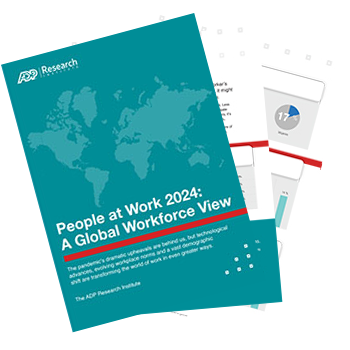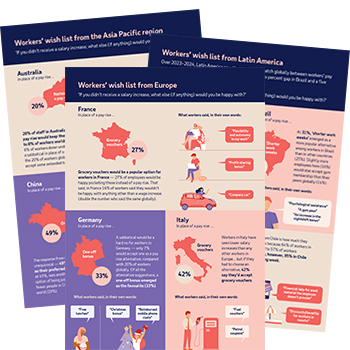
People at Work: A Global Workforce View
For the past four years, ADP Research has surveyed workers around the globe to learn about their on-the-job experiences. This work has illuminated the world’s journey through a deep economic downturn, the subsequent cost-of-living crisis and monumental change tied to remote and hybrid work. As we’ve passed each of these milestones, People at Work has captured how the global labour force has adapted and changed. The world is shaking off its pandemic-driven upheaval, but change hasn’t slowed. As new opportunities and challenges reshape the labour market, workers in some ways have remained constant in their priorities—they still put great value on remuneration and job security, for example. But in other ways, they feel under threat from technology, stress and shifting workplace norms.
Using detailed survey responses from more than 34,000 workers in 18 countries, People at Work continues to capture this evolution. In 2024, we uncovered six key themes.
People at Work 2024: A Global Workforce View
Country highlights
ASIA PACIFIC
- Australia
- China
- India
- Japan
- Singapore
EUROPE
- France
- Germany
- Italy
- The Netherlands
- Poland
- Spain
- Switzerland
- United Kingdom
LATIN AMERICA
- Argentina
- Brazil
- Chile
NORTH AMERICA
- Canada
- United States
Articles

insight
Revealed: the factors that influence employees’ flexible working options

insight
ADP’s research results: we need to talk about men at work
Europe by the numbers
Discover all our studies
People at Work: A Global Workforce View
One of the largest international studies of its kind, canvassing the views of over 34,000 workers in 18 countries, our research provides HR leaders with unique insights into the employee experience — people’s attitudes, aspirations, wants and needs.

People at Work 2023
Discover insights to better understand, motivate and retain your people.
People at Work 2023
Discover insights to better understand, motivate and retain your people.

People at Work 2022
Discover key insights to stay competitive and motivate your employees.
People at Work 2022
Discover key insights to stay competitive and motivate your employees.

People at Work 2021
Discover global worker insights a year on from the start of COVID-19.
People at Work 2021
Discover global worker insights a year on from the start of COVID-19.
Get your report now - discover key insights to better understand your workforce and transform your business.

 1. What workers want: pay—and more
1. What workers want: pay—and more
 2. What workers expect: pay increases
2. What workers expect: pay increases
 3. The promise and peril of remote work
3. The promise and peril of remote work
 4. ESG and DEI: a workforce divided
4. ESG and DEI: a workforce divided
 5. Career development: room for improvement
5. Career development: room for improvement
 6. Stress, the constant companion
6. Stress, the constant companion






